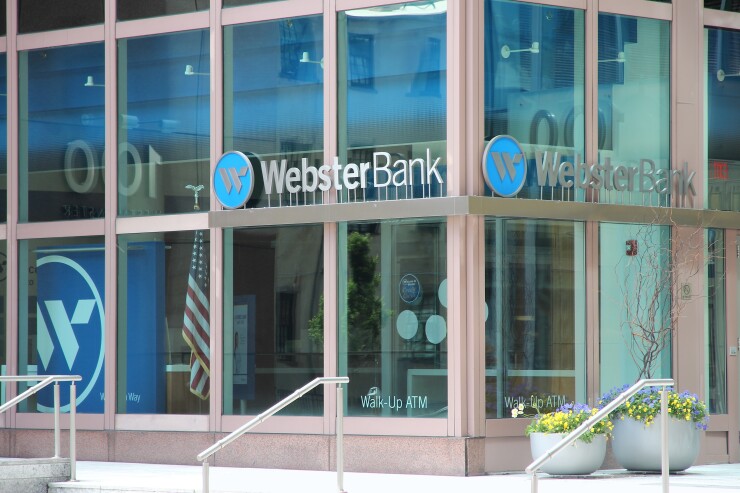
Webster Financial in Connecticut, which has long touted the diversity of its funding base, has agreed to buy a fintech platform that will provide yet another nontraditional source of deposits.
The parent company of Webster Bank plans to pay $350 million to acquire Ametros Financial, a custodian and administrator of medical funds from insurance claim settlements, according to a press release. Webster said it will acquire the platform from funds managed by Long Ridge Equity Partners, a private equity firm that specializes in the financial and business technology sectors.
The deal, which includes $804 million of sticky, low-cost deposits, will likely put to rest recent market speculation that Webster is thinking about selling its health savings account banking subsidiary, some analysts said Friday. Selling that unit, which some analysts and investors have valued at around $4 billion, would deliver a huge influx of capital.
In the press release announcing the all-cash deal, Webster CEO John Ciulla said the acquisition of Ametros will "enhance Webster's healthcare financial services expertise."
Given that language, "we tend to think that this is somewhat of a signal that they do not have plans to exit HSA," Piper Sandler analyst Mark Fitzgibbon wrote in a research note. "While Ametros is different than HSA, management described them as sort of companion-like businesses."
Pending regulatory approval, the transaction is expected to close during the first quarter of 2024.
Acquiring Ametros is the latest in a string of deals that Webster, a $73 billion-asset company based in Stamford, Connecticut, has put together in recent years, and the
In January, Webster
This most recent deal "closely aligns with our strategic focus on building a diverse and unique funding base," John Ciulla, CEO of Webster Bank, said in the release. "Ametros builds on Webster's history of developing non-traditional deposit verticals with a favorable financial profile."
Ciulla hinted at the possibility of doing such a deal during the company's third-quarter earnings call. In response to an analyst's question about how Webster would consider using excess capital, and whether a whole-bank acquisition was in the running, he said:
"I think we quite clearly mean sort of complementary acquisitions around fee-generating or deposit-gathering businesses, where we have a path to some organic growth. … It would be something [that] would be targeted on further low-cost deposit gathering or fee-generating businesses that are complementary to our existing activities."
The $804 million of deposits at Ametros, which have more than doubled over the past three years, are projected to increase at a compound annual growth rate of about 25% over the next five years, and their average duration is more than 20 years, Webster said in the release.
Luis Massiani, Webster's president and chief operating officer, said the acquisition serves three purposes.
"It's a fast-growing source of low-cost and long-duration deposits, provides new sources of noninterest income and enhances Webster's healthcare financial services expertise," Massiani said in an email.
"We believe Webster is best positioned by building a unique and differentiated funding base to efficiently and profitably provide credit to our commercial and consumer clients."
Webster's current funding base has six distinct components: a traditional consumer bank with more than 200 branches; an online banking platform called BrioDirect; a commercial bank; specialized treasury services for corporate clients; interLink, which is a cash sweep program administrator for broker-dealers; and HSA Bank, a health savings accounts subsidiary.
At the end of the third quarter, the consumer bank, which includes BrioDirect, held 39% of Webster's total deposits, or $23.6 billion, according to a company presentation. The commercial bank had 32% of total deposits, while HSA Bank, interLink and the corporate unit held 14%, 9% and 6%, respectively.
As of Sept. 30, Webster's deposits totaled $60.3 billion, up 11.7% year over year.
The interLink acquisition is not the only deal that Webster has completed since early 2022.
In February 2022, Webster wrapped up the
Analysts had mixed reactions to news of the pending Ametros deal.
In a research note, Jefferies analyst Casey Haire wrote that the acquisition offers "another unique funding source possessing robust growth potential." However, earnings-per-share accretion is "modest near-term," and it could take five years for Webster to earn back the $350 million purchase price, he wrote.
Like Fitzgibbon, Haire argued that the Ametros acquisition probably reduces the chances that Webster will sell its HSA Bank subsidiary. Webster has been
"The deal would likely temper market speculation" about an exit from the HSA Bank unit, Haire wrote, citing the language from Webster's press release that touted the company's "strategic focus on building a diverse and unique funding base."
Fitzgibbon said that "the price is a bit higher than we would have expected" and suggested that Webster's stock could be "a touch weaker" on the news.
Webster's stock price was down about 4% Friday. It is up 6.6% over the past five days.






